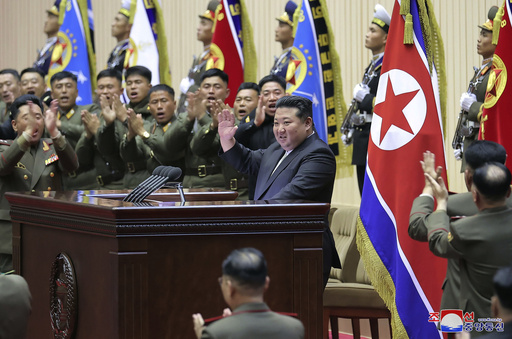
SEOUL, South Korea — North Korean leader Kim Jong Un has reiterated his demand for an unrestricted expansion of the country’s military nuclear capabilities in response to perceived threats from the United States. This statement, reported on Monday, marks Kim’s first explicit critique of Washington following the election of Donald Trump as President of the United States.
During a meeting with military personnel last Friday, Kim expressed strong disapproval of the U.S. for revising its nuclear deterrence strategies in coordination with South Korea and strengthening trilateral military cooperation with Japan. He described this arrangement as an “Asian NATO,” arguing that it contributes to heightened tensions and instability in the region.
Additionally, Kim took aim at the U.S. for its backing of Ukraine amid the ongoing Russian invasion. He claimed that Washington and its Western allies are utilizing Ukraine as a bulwark to wage a conflict against Moscow, aiming to broaden U.S. military influence, as reported by North Korea’s state-run Korean Central News Agency.
In recent months, Kim has increasingly sought to bolster relations with Russia, aligning himself with the concept of a new Cold War, while displaying solidarity with Russian President Vladimir Putin amid ongoing tensions with the West. Kim has strategically leveraged Russia’s conflict in Ukraine to expedite the growth of his nuclear arsenal, which now includes various nuclear-capable systems aimed at South Korea and intercontinental ballistic missiles that are believed to have the potential to strike the continental United States.
Although Kim has not directly acknowledged providing military assistance or troops to Russia for the Ukrainian conflict, the report from KCNA notably lacked any mention of Trump, whose presidential election victory has not been covered in North Korean state media thus far.
Kim engaged in three summits with Trump during the latter’s first term in 2018 and 2019; however, those diplomatic efforts quickly faltered due to disagreements over the exchange of sanctions relief and North Korea’s disarmament steps. Since then, North Korea has halted significant dialogue with both Washington and Seoul, opting instead to escalate its testing and military showcases in response to what Kim calls “gangster-like U.S. threats.” This has led to concerns in Seoul that Kim might receive advanced Russian military technology in exchange for his support amidst the conflict in Ukraine.
Trump’s election victory has rekindled speculation regarding a possible revival of summit diplomacy with Kim, often characterized by critics as a “bromance.” However, many experts believe that a swift return to the dynamics of 2018 is improbable, given the substantial shifts in the regional security landscape and global geopolitics since that time.
While the issue of North Korea’s nuclear ambitions was relatively isolated during Trump’s first term, it has become intertwined with other complex challenges stemming from Russia’s invasion of Ukraine, compounded by a decline in effective sanctions against Pyongyang. According to Hwang Ildo, a professor at South Korea’s National Diplomatic Academy, North Korea’s nuclear and missile capabilities are now more sophisticated, potentially enhancing Kim’s leverage in negotiations.
Kim’s approach to increasing North Korea’s role in a collective stance against the U.S. might gain traction if Trump escalates tariffs and re-ignites a trade conflict with China, which remains North Korea’s primary ally and economic support, Hwang concluded.
